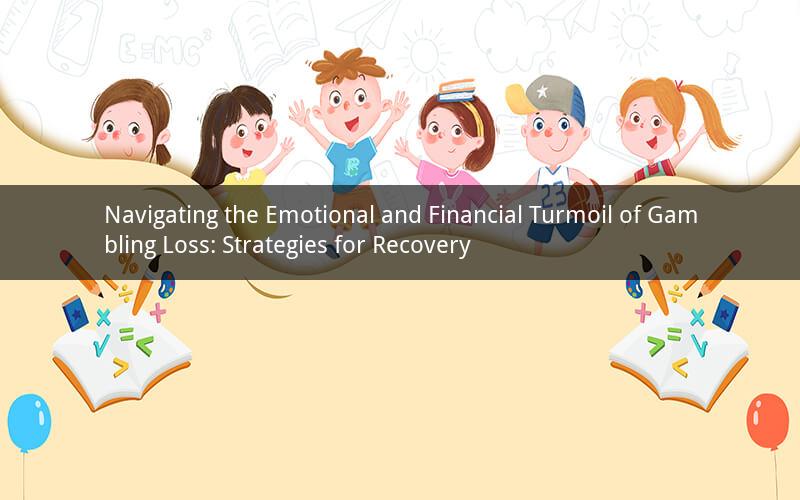
Introduction:
Gambling can be an exhilarating and entertaining pastime, but it can also lead to devastating consequences when things go awry. Dealing with gambling loss is a complex process that involves emotional, financial, and psychological challenges. In this article, we will explore various strategies to help individuals navigate the turmoil of gambling loss and embark on the path to recovery.
1. Recognize the Problem:
The first step in handling gambling loss is to acknowledge that you have a problem. It is essential to accept that gambling has become an uncontrollable habit that has negative repercussions on your life. This recognition opens the door to seeking help and taking the necessary steps towards recovery.
2. Seek Support:
Support is crucial during the recovery process. Surround yourself with individuals who understand your struggle and offer encouragement. Consider joining a support group such as Gamblers Anonymous or seeking therapy from a qualified professional. These resources can provide you with the guidance and motivation needed to overcome gambling loss.
3. Develop a Financial Plan:
Gambling loss often leads to significant financial strain. To regain control of your finances, create a detailed budget that includes expenses, savings, and debt repayment. Prioritize paying off any debts accumulated through gambling and focus on building an emergency fund. Avoid making impulsive financial decisions that could exacerbate your situation.
4. Identify Triggers:
Understanding the triggers that lead to gambling behavior is crucial in preventing relapse. Common triggers include stress, boredom, or the desire to escape reality. Identify your triggers and develop coping mechanisms to deal with them without resorting to gambling. Engage in healthy activities such as exercise, hobbies, or spending time with loved ones to distract yourself from the urge to gamble.
5. Cultivate Self-Compassion:
Dealing with gambling loss can be emotionally draining. It is essential to practice self-compassion and treat yourself with kindness during this challenging period. Remind yourself that you are not defined by your gambling habits and that recovery is a journey, not a destination. Avoid self-blame and negative self-talk, and focus on positive affirmations to build self-esteem.
6. Establish Boundaries:
Setting clear boundaries is crucial in preventing future gambling loss. Limit your exposure to gambling environments and remove access to gambling websites or apps. Inform friends and family about your goals and seek their support in holding you accountable. Consider seeking legal assistance to restrict your access to gambling facilities.
7. Learn from the Experience:
Reflect on your gambling experiences and learn from the mistakes you made. Identify patterns in your behavior and consider the consequences of your actions. Use this knowledge to develop healthier coping mechanisms and make informed decisions in the future.
8. Maintain a Healthy Lifestyle:
Physical and mental well-being play a significant role in the recovery process. Adopt a balanced diet, exercise regularly, and ensure adequate sleep. Engaging in activities that promote relaxation and stress relief, such as meditation or yoga, can help improve your mental health and prevent relapse.
9. Stay Connected:
Recovery is an ongoing process, and maintaining connections with others who understand your struggles is vital. Attend support group meetings, join online forums, or seek out communities that offer support and understanding. Sharing your experiences and listening to others can provide valuable insights and encouragement.
10. Celebrate Milestones:
Recognize and celebrate your achievements along the journey to recovery. Whether it is a week without gambling, paying off a debt, or attending a support group meeting, take the time to acknowledge your progress. Celebrating milestones can boost your self-esteem and motivate you to continue on the path to recovery.
FAQs:
1. How long does it take to recover from gambling loss?
Answer: The duration of recovery varies for each individual. Some may experience immediate relief, while others may face challenges for an extended period. It is crucial to be patient and persistent in your efforts to recover.
2. Can I still enjoy gambling responsibly after overcoming gambling loss?
Answer: Yes, it is possible to enjoy gambling responsibly after overcoming gambling loss. However, it is essential to set strict boundaries, monitor your behavior, and be aware of the potential risks. If you feel the urge to gamble, seek support and consider taking a break.
3. What if I relapse after overcoming gambling loss?
Answer: Relapse is a common challenge in the recovery process. If you experience a relapse, do not be discouraged. Instead, analyze what led to the relapse and learn from it. Reach out for support and return to your recovery plan with renewed determination.
4. Can therapy help me recover from gambling loss?
Answer: Yes, therapy can be an effective tool in dealing with gambling loss. Therapists can provide personalized strategies, support, and coping mechanisms to help you navigate the challenges of recovery. Consider seeking therapy as part of your recovery journey.
5. How can I prevent gambling loss from occurring again?
Answer: To prevent gambling loss from recurring, establish clear boundaries, seek support, and maintain a healthy lifestyle. Stay connected with others who understand your struggles and be vigilant about identifying and avoiding triggers. Remember that recovery is an ongoing process, and taking proactive steps can significantly reduce the risk of relapse.